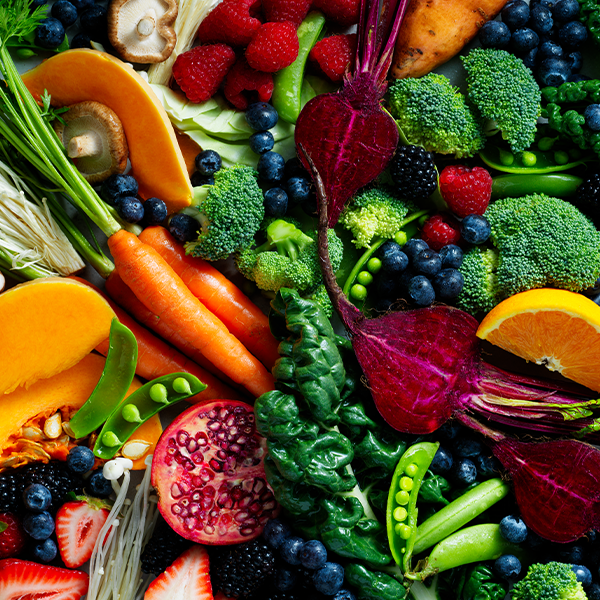
essential rainbow blend
Fruits and vegetables provide the whole spectrum of colourful phytonutrients, along with a wide array of vitamins, minerals and antioxidants.
The Essential Rainbow blend includes a combination of whole food ingredients renowned for their nutrient density, high phytonutrient levels, as well as some of the highest potency antioxidants.
Rainbow vegetable and fruit blend contains beetroot, broccoli, pumpkin, wheatgrass, spinach, carrot, sweet potato, orange, apple, sunflower seeds, barley grass, cabbage, prune, raspberry, strawberry, pomegranate, elderberry, blackcurrant, blueberry, cranberry, acai, goji, maitake mushroom, and shiitake mushroom.
These ingredients contain high levels of polyphenols. What are polyphenols? They’re naturally occurring compounds that are responsible for the unique colours, flavours and aromas of each plant.
The antioxidant and anti-inflammatory properties of polyphenols in the Rainbow fruit and vegetable blend work to provide protection against free radical damage, support immunity and promote a healthy gut microbiome.[1]
Recent studies have shown that high polyphenol fruit and vegetable intake increases levels of a protective protein called brain-derived neurotrophic factor (BDNF). BDNF is a key molecule necessary for healthy brain function, as well as brain cell survival and growth.2 The results of the study suggested that increased polyphenol intake helped to suppress neuroinflammation and oxidative stress.[3]
Maitake and shiitake mushrooms have been included in the Rainbow vegetable and fruit due to their high levels of antioxidants and beta-glucans. Beta-glucans are a type of soluble fibre that provide unique health benefits, including increasing immune defences and helping the gut microbiome to thrive.[4-6]
Rainbow antioxidant blend contains astaxanthin, turmeric extract, and tomato lycopene.
Antioxidants provide protection against the damaging effects of free radicals on the cells, tissues and even organs - they also protect against a process called oxidative stress. Oxidative stress is an accumulation of free radicals in cells and tissues that can lead to damage if antioxidant intake is too low.
Essential Rainbow includes a blend of science-backed ingredients famous for their extraordinarily potent antioxidant and anti-inflammatory benefits:
Astaxanthin belongs to the family of antioxidants known as carotenoids, a class of phytonutrients found in red, yellow and orange plants. Astaxanthin has been shown to have the highest oxygen radical absorbance capacity on the ORAC scale of all carotenoids. The ORAC scale is used to measure the antioxidant values of ingredients.[7]
Turmeric extract provides anti-inflammatory and antioxidant benefits. Curcumin, the active compound in turmeric, is proven to reduce markers of oxidative stress.[8]
Lycopene also belongs to the carotenoid family and provides anti-inflammatory and antioxidant benefits, helping to protect the body from oxidative damage.[9]
References:
[1]. Kumar Singh, A., Cabral, C., Kumar, R., Ganguly, R., Kumar Rana, H., et al. (2019). Beneficial effects of dietary polyphenols on gut microbiota and strategies to improve delivery efficiency. Nutrients, 11(9):2216.
[2]. Miranda, M., Facundo Morici, J., Zanoni, M.B. & Bekinschtein, P. (2019). Brain-derived neurotrophic factor: a key molecule for memory in the healthy and pathological brain. Front. Cell. Neurosci.
[3]. Narita, Z., Nozaki, S., Shikimoto, R., Hori, H., Kim, Y., et al. (2022). Association between vegetable, fruit, and flavonoid-rich fruit consumption in midlife and major depressive disorder later in life: the JPHC Saku mental health study. Translational Psychiatry, 12(412).
[4]. Vetvicka, V. & Vetvickova, J. (2014). Immune-enhancing effects of Maitake (Grofola frondosa) and Shiitake (Lentinula edodes) extracts. Ann Transl Med, 2(2):14.
[5]. Akramiene, D., Kondrotas, A., Didziapetriene, J. & Kevelaitis, E. (2007). Effects of beta-glucans on the immune system. Medicine (Kaunas), 43(8):597-606.
[6]. Jayachandran, M., Chen, J., Chng, S.M.C. & Xu, B. (2018). A critical review on the impacts of B-glucans on gut microbiota and human health. The Journal Nutritional Biochemistry, 61:101-110.
[7]. Donoso, A., Gonzalez Duran, J., Agurto Munoz, A., Gonzalez, P.A. & Agurto Munoz, C. (2021). Therapeutic uses of natural astaxanthin: an evidence-based review focused on human clinical trials. Pharmacological Research, 166:105479.
[8]. Hewlings, S.J. & Kalman, D.S. (2017). Curcumin: a review of its effects on human health. Foods, 6(10):92.
[9]. Kumar, V.N.P., Elango, P., Asmathulla, S. & Kavimani, S. (2017). A systematic review on lycopene and its beneficial effects. Biomed Pharmacol J, 10(4). "